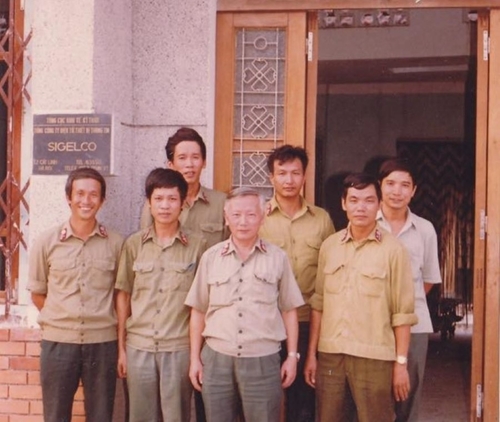Go-getters
Developed from the military, Viettel generations have special characteristics, including discipline observance, strong will, and pioneering spirit. They dare to set goals and to overcome challenges. In 1989, Sigelco was formed from four factories of the Signal Corps. The very first 10 members of the company, who are skillful signal soldiers with no business experience, were tasked to begin running business.
Right after the establishment, the company proposed 11 electronic equipment manufacturing projects. Notably, they were immediately agreed upon by the State, paving the way for the company's dream of forming a defense industry sector. But at that time, there were no jobs, and salaries were not enough to pay employees. So where did the money come from to carry out their projects? Putting aside the goal of producing its own information machines and building a heavy industry, Sigelco had to find a way to survive first.
    |
 |
|
Comrade Vo Dang, first leader of Viettel and Sigelco's staff in 1990 |
Pulling cables and erecting poles share many similarities with their professions. However, there were also many companies with similar functions. Sigelco could only implement projects located in complex terrain, with technical difficulties and financial shortage. Then the company gradually became famous as it successfully completed a number of key national-level contracts, such as the tallest television tower in Vietnam and the longest digital microwave line in Vietnam.
Desire to receive and do difficult tasks
Those experiences helped Sigelco become a leading company in the field of telecommunications construction. Since then, the company dreamed of building its own telecommunications network. Therefore, the comapny decided to receive a contract to build the North-South military fiber optic cable backbone called 1A from just two redundant cables on a 500kV super high-voltage transmission line. To do so, it had to find a solution to receive and transmit data on the same optical fiber at a distance of more than 2,300km, which had never been done before. Furthermore, to ensure military secret, the company was not allowed to hire foreign experts.
In that case, the company found its own way. Specialized books and documents were not available, so they had to divide the contract into phases to conduct one by one by themselves. After two years of working, trying, failing, and trying again, Viettel finally completed more than 2,300km of fiber optic cables with strict requirements. Still, the dream of building its own mobile network had to be put aside because the company did not have enough money.
Then, a small opportunity occurred, helping the company set foot in the telecommunications sector. Accordingly, internet-based mobile phone technology, which did not require infrastructure investment, was very suitable for the company’s conditions at that time. Thus, the company became the first provider licensed to operate domestic and international long-distance telephone services with the name VoIP 178. Service fees quickly reduced by 75 per cent compared with before.
However, running VoIP 178 was not a piece of cake. Due to the lack of infrastructure, the company depended on its partners’ decisions, from business scope to service quality, and even fee collection. These difficulties encouraged the company to own telecommunications infrastructure.
Self-reliance to fulfill difficult tasks
Viettel desired to run a mobile business. But with no experience, it planned to follow other mobile providers: Setting up a joint venture. However, its Australian partner required many unconditional demands, which did not satisfy Viettel’s benefits.
Therefore, the company decided to build its own mobile network, at the time when its capital was only enough to build mobile broadcasting stations in Hanoi and Ho Chi Minh City. Meanwhile, the company had 100 members at that time; most of them have only experience in constructing telecommunications projects.
However, the problem of low investment capital was solved by purchasing equipment with deferred payment agreement of four years. Accordingly, it took advantage of the world economic crisis, as there was a substantial surplus of unsold equipment stockpiled in warehouses worldwide. Hence, the company was awarded an order of 5,000 base transceiver stations. However, they company had to quickly roll out the contract to put it into operation soon, so that they then had money to pay the debt.
In order to rapidly conduct the contract, Viettel built a typical standard for all base transceiver stations, and then assigned its staff to synchronously deploy across the country. Within only two years, Viettel owned a large number of base transceiver stations, contributing to bringing telephone density in Vietnam from 4% in the early 2000s to 90% in 2007 and now 130%. Viettel successfully makes mobile service from being a luxury to an essential part of Vietnamese people's daily lives.
(to be continued)
Translated by Minh Anh